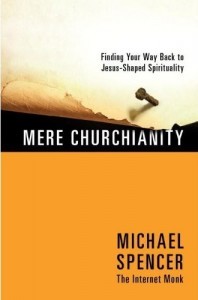Mere Churchianity
 You won’t find many whole-hearted endorsements of this book by evangelical heavy-hitters. But it’s the best book I’ve read since we left our church about a year ago, one that I resonated with in almost every respect and that gives a needed and truthful critique of institutionalized evangelicalism. Written by Michael Spencer (a.k.a. the Internet Monk), who died just a few months before it was published in 2010, Mere Churchianity focuses on the contrast between what he calls Jesus-shaped spirituality, and church-shaped spirituality. The former puts Jesus at the center without a whole lot of intermediaries; the latter puts the church with its programs and building funds and pastor-centrism and Christian subculture practices at the center.
You won’t find many whole-hearted endorsements of this book by evangelical heavy-hitters. But it’s the best book I’ve read since we left our church about a year ago, one that I resonated with in almost every respect and that gives a needed and truthful critique of institutionalized evangelicalism. Written by Michael Spencer (a.k.a. the Internet Monk), who died just a few months before it was published in 2010, Mere Churchianity focuses on the contrast between what he calls Jesus-shaped spirituality, and church-shaped spirituality. The former puts Jesus at the center without a whole lot of intermediaries; the latter puts the church with its programs and building funds and pastor-centrism and Christian subculture practices at the center.
His critics would argue that when he acknowledges that those who leave the church are doing so because it’s the only path they see toward authentic spiritual growth, he’s being too soft on wimps who have unrealistically high expectations and who just want to be able to sin more easily. (I’ve read a couple of their reviews. And I’ve been around evangelicals long enough to have heard this a time or two… and more.) The faithful, they say, stay — because the institutional church as evangelicalism defines it over the last 50 or 60 years is really the only legitimate forum for authentic spiritual growth.
I would respond that doubtless such “wimps” exist, but this book is not addressed to them. And if they read it, they will find themselves seriously challenged. It’s not a book for game-players. The author’s honesty and devotion to Jesus is much too real. No one looking for a feel-good justification of lip-service Christianity will be interested.
I’m in my late 40’s, and I’ve been an active member of evangelical churches all my life. I’m a committed disciple of Jesus. But over the last decade, my confidence in the institution has evaporated. We left our church with fear and trembling, and though we’ve visited several over the last year they all look like the same cereal in different colored boxes. Most of our spiritual growth is occurring as we follow Jesus here, outside the walls. It’s not always easy, and our journey is not over. But our family is coming to life spiritually in new ways.
Mere Churchianity is the first book I’ve read that represents neither a diatribe against the institutional church (Michael Spencer is a trained pastor who served in ministry at a Christian school for 17 years) nor a vilification of “deserters” such as myself. It maintains an admirable balance, rightly condemning the artificiality of much that goes on in church but acknowledging that staying (as he himself has stayed) is a viable option. It’s just not the only option. He affirms that God is not confined there, and that spiritual authenticity and ministry and fellowship and sacramental living are just as possible outside the walls.
Some have faulted the book for not giving a detailed description of what “unchurched church” (for lack of a better name) should look like. Spencer chooses to conclude that those who are on the brink of leaving, or have left, to follow Jesus, have a number of options. It’s as wide open as one might expect with an infinitely creative God at the helm. To hand people a new program after so thoroughly facing all the limitations of program-based faith would have been untrue to the rest of the book. Finding Jesus-shaped spirituality involves listening to the Holy Spirit and trusting him to show you the next step. Substituting “the Michael Spencer plan” would turn this into just another religious self-help book — of which there are already far too many.
The writing is highly readable, unpretentious, funny at times, and always truthful. Spencer had the gift of speaking the truth in love, and he is able to talk about the failings of the church, somehow, without bitterness or condemnation or superiority. His insights are deep (I loved his reading of the story of the prodigal son) and he consistently directs our eyes to Jesus. I felt that the book was a blessing — a last blessing, as it turns out, from Michael Spencer — on all seekers of Jesus, whether inside the church or outside.




10 Comments
Carolin Migliazzo
How are you incorporating “living in community with other believers” outside the context of your immediate family since leaving church? I am currently attending seminary and one of the professors stated that seminary students are famous for not attending church while they are in seminary. They cite various reasons for their lack of attendance such as” “I am only here two years, so why bother, I am getting plenty of bible reading in my classes, or I can’t find a decent church to attend”. The professor pointed out that seminary students are notoriously picky about where they attend church. because their standards are so high. Regardless, the professor went on to say that we need to live in community. He suggested that the students try four churches and then pick “the least worst one” and make it your home. I found the professor’s honesty refreshing and the idea that I would attend the church that I consider “the least worst” was an honest reflection of my own thoughts.
I love what Bonhoeffer has to say about church community:
“Christian community has been shattered because it has lived on the basis of wishful image. A great disillusionment with others, with Christians in general, and if we are fortunate, with ourselves, is bound to overwhelm us as surely as God desires to lead us to an understanding of genuine Christian community. By sheer grace God will not permit us to live in a dream world even for a few weeks and to abandon ourselves to those blissful experiences and exalted moods that weep over us like a wave of rapture. For God is not a God of emotionalism, but the God of truth. Only that community which enters into the experience of this great disillusionment with all its unpleasant and evil appearances begins to be what it should be in God’s sight, begins to grasp in faith the promise that is given to it. The sooner this moment of disillusionment comes over the individual and the community, the better for both.Those who love their dream of Christian community more than the Christian community itself become destroyers of that Christian community even though their personal intentions may be ever so honest, earnest and sacrificial. Will not the very moment of great disillusionment with my brother or sister be incomparably wholesome for me because it so thoroughly teaches me that both of us can never live by our own words and deeds, but only by that one Word and deed that really binds us together, the forgiveness of sins in Jesus Christ?” (Life Together, 35,36)
…The reality of this quote is in how it brings us back to who we each are….sinners in need of grace…and because of this we can live with each other, forgive each other, and love each other with the same love we have received from Jesus Christ. To me that is what church is all about.
Janet
It’s a wonderful quotation, one I’m familiar with. All I can say is that the church is not confined within the walls of the institution. Faith isn’t meant to be practiced in isolation, and we are blessed with opportunities to participate in community with other believers. It’s an area we are always working on.
I wonder what Bonhoeffer would say if he had the opportunity to be in one of our modern churches in America.
As a seminary student, you might find this a useful book.
Debd
I suspect that Bonhoeffer would be appalled. Bonhoeffer was Lutheran, and as such would believe that the central part of the community of believers is the Eucharistic meal. This cannot be done (as it was practiced by any church which follows the ancient practice) outside of the community of believers headed by a pastor/priest. There’s just no way to get around that it. I know, I know… many Evangelicals look at the Eucharist very differently but , as a Lutheran, Bonhoeffer wasn’t one of them After that Sacrament would be the other which he practiced: Baptism, marriage, etc. etc. He would be part of a community where the pastor is the shepherd and servant of God – not the “great preacher” or “leader”. Yes, he was a very good preacher… as was John (The Goldenmouthed) Chrysostom…but both knew that the centrality of worship was not the preaching (or praise bands), but the Eucharist.
In this way I think he would agree with the author, who seems to support church as an important place that a community of believers gather. From your review, the author doesn’t seem to want to throw out the baby with the bathwater.
I am so, so sorry that you are still hurting and still rudderless. I have attempted to stay back and hold my tongue because I have such strong feelings about it and I’m quite biased about where you should be searching. :) It just hurts my heart when I see my friends (real or internet) longing for the church that Christ Himself instituted, but continuing to look within the confines of modern American Protestantism. Besides, I would like to consider you my friend and not that annoying ex-Protestant who only sings one note.
Janet
Not sure how to take that last line, Deb. If you mean you can’t consider me a friend until I join the Orthodox church, I guess we’re in trouble! But I hope it doesn’t mean that.
Leaving after 48 years isn’t something that happens because of personal hurt. I haven’t talked about why we left, but it had more to do with integrity before God. We believe we’re walking in obedience, so we don’t consider ourselves rudderless. I wouldn’t say we’re ex-Protestant either, though as I said the journey isn’t over. I like where we are.
In one section of Mere Churchianity, Spencer describes his investigation of nine alternatives. (One of them is the Orthodox church.) I don’t have the wherewithal to do a lot of shopping around — I’m not much of a consumer and have gotten worn out with that before reaching nine alternatives. But I like the way he describes where he came down (incidentally, for him it also included staying in Protestantism).
He concludes, “Each of these options has advocates who write eloquent books and blogs pointing the rest of us to greener pastures. You might have made other stops that don’t show up on my list. Like many of you, I took just about every one of those side roads on the journey, but I didn’t find a stopping place, and I never bought the idea that trading up or moving to a new neighborhood would make much difference in the authentic Christian life I wanted to lead.
I did, however, find out why so many people leave the church completely while still holding on to some kind of spirituality. It isn’t just because of their bad experiences. For many, it’s because Jesus is leading them out of the church as they have known and experienced it. They find, after years of searching, that there is no solution to the church problem.
There is only one reliable constant. There is God, who is moving people out into the world. This is a Spirit-guided evolution of the movement Jesus started. It is a process of God moving Christians out of pews and toward the Kingdom that Jesus promised. And there is no predicting where that journey might take a person. But if it takes him or her outside of organized Christianity, why would we argue with God about it?
…Jesus started a movement that was a dynamic, organic, evolving, and incredibly diverse body. Realizing this gave me a much different perspective on what the Holy Spirit was doing in the lives of Jesus-followers and in the world.”
Debd
oh, no no! I didn’t mean that at all. I meant that I wanted to be a friend to you rather than just an annoying ex-Prot.
9 alternative!? Yikes, I don’t have the stamina either. I did 3 in my adult life – just not in quick succession. I know of someone else who did some kind of smorgasbord of churches over the course of a year. It didn’t seem like she did *any* of them any justice.
the author said:, “…they find there is no solution to the church problem.” See, I think that is sad, because I am convinced that the Church (EO) is the pillar and ground of truth – as Paul says. I believe She is the Arc of Salvation. Yes, there are problems – serious ones – within the EO church… but the Church is always the fullness of the Faith. Its a bit of a dichotomy. The Church is flawed but the fullness of the Faith. How can that be? I don’t believe that Jesus started a “movement” either. Jesus came to unite us to God and He instituted a way of doing just that via the Church. It’s not that others cannot have union with God outside of the church. Clearly, there are many people doing just that in many Christian traditions. But, I can’t anymore.
I apologize for making assumptions about why you’ve left the institutional church structure. You’re right, there are varied reasons why people go. Unfortunately, most of those, in my experience, have been because of hurt and/or loss of trust. So I was just projecting that onto you. Sorry.
Janet
Whew! I knew I must be misunderstanding something somewhere — it didn’t sound like you. I’m glad I’m not the annoying ex-Prot. (Though being annoying IS a special gift of mine…)
You always give me a lot to think about. Maybe someday we’ll have a real conversation.
Debd
A real conversation would be lovely. I was blessed to meet Gretchen Joanna, whom you introduced to me via your blog. I thought at the time that it would have been so fitting to have you join us.
One of my gifts, besides being the Queen of typos, is stepping on people’s toes… I hope I haven’t done so here. Perhaps we’re both just intense about our convictions. :)
Janet
Nah… No worries.
For my part, I’ve felt badly today about reacting defensively. Ironic, considering that I have nothing to defend… We haven’t “arrived” yet.
Anyway, I value your point of view, so don’t stop weighing in, please. :-)
Amy @ Hope Is the Word
Our family has been on a journey this summer, too, though not quite as extreme in its outcome (yet! and I don’t think finally!) as yours. However, I still wonder (and wander, unfortunately). I think I might gain something from this book. Thank you for an insightful post, and for the comments, which are almost as good.
Janet
It was good for me because it affirmed my experiences and showed me I’m not crazy! But it doesn’t tell you what to do.
We aren’t yet “settled.” I don’t especially like the uncertainty, but at l like that we’re not just going through the motions.